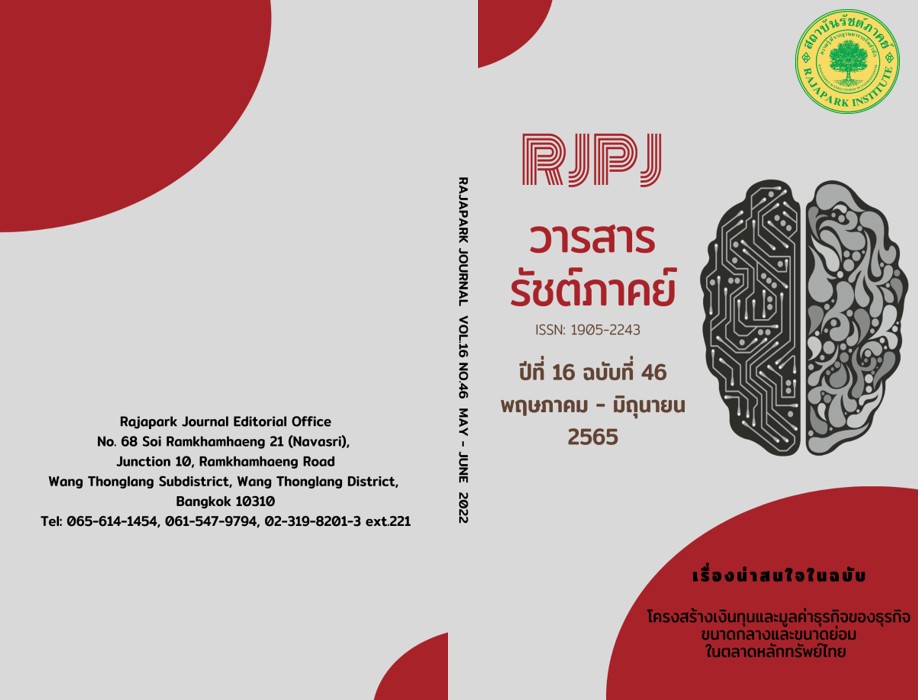The Relationship Between Profitability and Executive Compensation of Listed Companies in the Stock Exchange of Thailand
Main Article Content
Abstract
The purpose of this research was to study the relationship between profitability and executive compensation of listed companies in the Stock Exchange of Thailand. It is a quantitative research. Using secondary data, financial data is collected from the annual report and the annual registration statement. The sample groups used in the study were companies listed on the Stock Exchange of Thailand, all groups of 50 indexes, except for financial institutions. The sample group used must have complete data for all 3 years, namely 2018-2020, a total of 3 years, totaling 29 companies, 87 samples. The statistics used in the data analysis were descriptive statistics and inferential statistics in Pearson's correlation coefficient analysis and multiple linear regression analysis. The results showed that the return on assets had a statistically significant correlation of 0.05 positively with the executive compensation and the return on equity had a statistically significant correlation of 0.05 positively with the Executive Compensation while the gross profit margin Profit margin before finance costs and income tax and the net profit margin is not related to the remuneration of the executive compensation.
Article Details

This work is licensed under a Creative Commons Attribution-NonCommercial-NoDerivatives 4.0 International License.
Views and opinions appearing in the Journal it is the responsibility of the author of the article, and does not constitute the view and responsibility of the editorial team.
References
Budsaratragoon, P., & Lhaopadchan, S. (2017). The Study of the Relationship Between the Remuneration of Directors at the Level of Good Corporate Governance and Performance of Listed Companies of Thailand. In CMRI Working Paper Forum 1/2017, Bangkok, Thailand.
Hall, B., & Liebman, J. (1998). Are CEOs Really Paid Like Bureaucrats? The Quarterly. Journal of Economics, 113(3), 653-691.
Jensen, M.C., & Murphy. K.J. (1990), Performance Pay and Top-Management Incentives. Journal of Political Economy, 98(2), 225-264.
Klathae, M. (2019). Correlation Study of Corporate Governance Scores Independent Director's Remuneration and Performance of Companies Listed in the Stock Exchange of Thailand (Food and Beverage Industry)[Independent study, University of the Thai Chamber of Commerce].
Munruethai, P. (2015). The Relationship Between Directors Fee the Financial Performance of Listed Thai Companies[Independent study, Thammasat University].
Narayam, S., & Suwanna, T. (2019). The Relationship between Profitability and Executive Compensation of Companies Listed on The Stock Exchange. Rajabhat Rambhai Barni Research Journal, 13(3), 26-33.
Pattaravanichanon, P. (2010). Study on the Relationship Between Profitability and Executive Returns of Companies Listed on the Stock Exchange of Thailand[Independent study, Thammasat University].
Saechua, P., & Boonmunewai, S. (2019). The Relationship Between Family-Firms, Executive Compensation, and Firm Performance of Listed in the Stock Exchange of Thailand. KKBS Journal of Business Administration and Accountancy, 3(2), 75-95.
Songjarean, P. (2021). The Relationship Between Financial Ratios and Return on Assets of Listed Companies in the Stock Exchange of Thailand. Rajapark Journal, 15(38), 30-41.
Sukmawati, F., & Garsela, I. (2016). The Effect of Return on Assets and Return on Equity to the Stock Price. Proceedings of the 2016 Global Conference on Business, Management and Entrepreneurship, Advances in Economics, Business and Management Research, 15, 53-57.
Thumwirod, S., & Sukwatanasinit. K. (2021). The Relationship Between Financial Performance and Benefits Executive and Director of Service Industry at Registered in the Stock Exchange of Thailand. Journal of Arts Management, 5(2), 428-441.
Yokpitakchoke, A., & Buachoom, W. (2020). The Relationship between Earnings Management and Executive Compensation of Thai Listed Companies in the Market for Alternative Investment (MAI). Business Administration and Economics Review, 17(1), 116-132.


